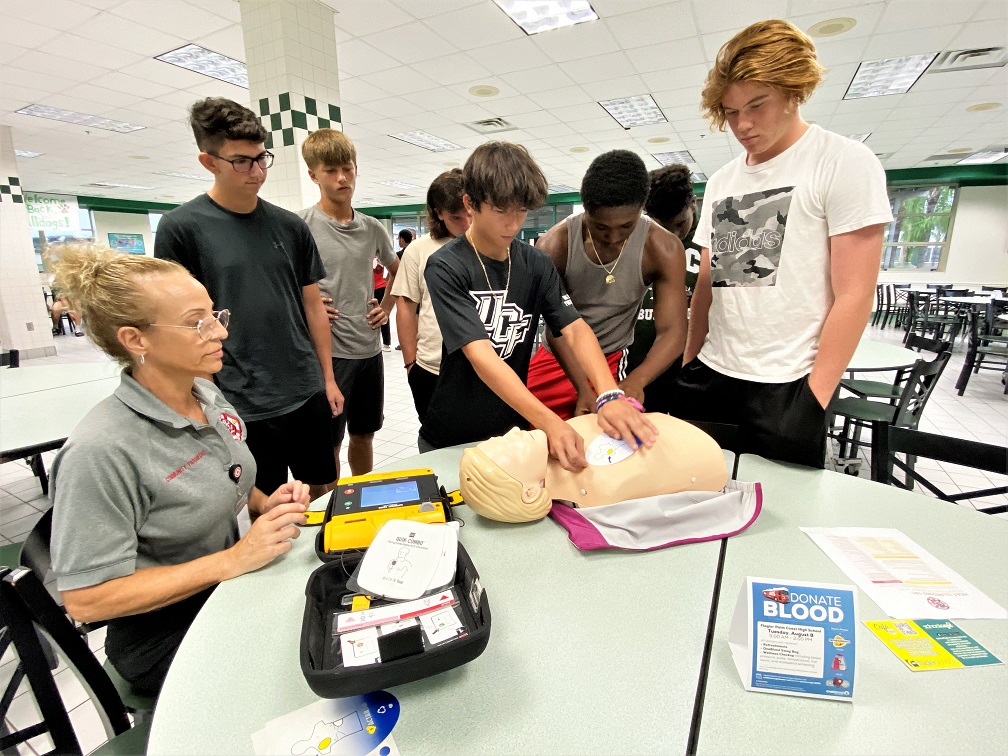August 9, 2023 – When two famous athletes suffer cardiac arrest within seven months of each other – notably NFL player Damar Hamlin and University of Southern California basketball player Bronny James (son of LeBron James) – coaches at all levels take notice.
Flagler-Palm Coast High School Football Head Coach Daniel Fish and Assistant Coach Jason Winkler invited Flagler County Fire Rescue Community Paramedics Rob Errett and Tracy Farmer to teach their players hands-only CPR, cardiopulmonary resuscitation, because of the recent incidents. Given that the team numbers about 90 athletes, firefighter-paramedics Ronald Titus, and Jaevon Jones – a 2020 FPC alumni of the Fire Leadership Academy – assisted with the training.
“This emergency procedure can help save a life when breathing or the heart stops. The American Red Cross has determined that chest compressions can be effective without breaths,” Farmer said. “You want to push hard and fast, 100 to 120 compressions a minute, with a depth of two inches.”
Farmer showed a video of a possible scenario that emphasized that the Bee Gees song “Stayin’ Alive” is precisely the right rhythm for performing CPR. The Center for Disease Control (CDC) encourages getting some education about CPR, as preparation is key. According to its website, CPR can double or triple the chance of survival if it is performed in the first few minutes of cardiac arrest.
No cause has been reported for the cardiac arrest suffered by 18-year-old Bronny James late last month. According to the American Heart Association, 25-year-old Damar Hamlin’s cardiac arrest was caused by “commotio cordis,” a rare event caused by a blow to the chest in which the impact induces a potentially lethal heart rhythm disturbance, or arrhythmia, called ventricular fibrillation.

“You don’t need a special certification or formal training to perform CPR, but you do need education,” the CDC website states. “If cardiac arrest happens to someone near you, don’t be afraid – just be prepared! Follow these steps if you see someone in cardiac arrest:
- “Call 9-1-1 right away. If another bystander is nearby, save time by asking that person to call 9-1-1 and look for an automated external defibrillator (AED) while you begin CPR. AEDs are portable machines that can electrically shock the heart and cause it to start beating again.
- “Give CPR. Push down hard and fast in the center of the chest at a rate of 100 to 120 pushes a minute. Let the chest come back up to its normal position after each push. The American Heart Association (AHA) recommends timing your pushes to the beat of the song ‘Stayin’ Alive.’ This method of CPR is called ‘hands-only’ and does not involve breathing into the person’s mouth.
- “Continue giving CPR until medical professionals arrive or until a person with formal CPR training can take over.”
Errett also spoke to the football players about heat related illnesses such as heat cramps, heat exhaustion, and heat stroke.
Heat cramps: Heat cramps are the mildest form of heat illness and consist of painful muscle cramps and spasms that occur during or after intense exercise and sweating in high heat.
Symptoms
- Painful muscle cramps, especially in the legs.
- Pain or spasms in abdomen, arms, or legs
Treatment
- Move to a cool place and rest.
- Do not continue to participate in the activity.
- Remove excess clothing and place cool cloths on the skin, fan skin.
- Drink clear juice, sports drinks, or water with food.
- Avoid salt tablets.
- Stretch cramped muscles slowly and gently.
Medical attention should be sought…
- For those with heart problems.
- For those on low-sodium diets.
- For those whose cramping doesn’t subside within 1 hour.
Heat exhaustion: Heat exhaustion is more severe than heat cramps and results from a loss of water and salt in the body. It occurs in conditions of extreme heat and excessive sweating without adequate fluid and salt replacement.
Symptoms
- Heat cramps.
- Rapid heartbeat.
- Heavy sweating.
- Slightly elevated body temperature.
- Nausea.
- Vomiting.
- Dizziness.
- Headache.
- Fatigue.
- Weakness.
- Fast, shallow breathing.
- Irritability.
Treatment
- Stop all activities.
- Rest in a cool area.
- Drink plenty of cool beverages.
- Take a cool shower, bath, or sponge bath.
Medical attention should be sought…
- If symptoms worsen or do not improve within one hour.
Heat stroke: Heat stroke, the most severe form of heat illness, occurs when the body’s heat-regulating system is overwhelmed by excessive heat. It is a life-threatening emergency and requires immediate medical attention.
Symptoms
- High body temperature.
- Confusion.
- Lack of coordination.
- Hot and dry skin.
- Profuse sweating.
- Rapid heartbeat and breathing.
- Throbbing headache.
- Fainting.
- Seizures, coma.
Treatment
- Call 9-1-1 or seek medical assistance immediately.
- Move into a cool, shaded area.
- Remove any excessive clothing.
- Try to cool the body down with cool water, wet towels, or applying ice to armpits, neck, and wrists.
- Do not force the victim to drink liquids or allow them to take pain killers or salt tablets.
Medical attention should always be sought!
Flagler County Fire Rescue teaches public CPR classes on the first Saturday of each month. There is nominal cost of $5. Preregistration is required and can be done by contacting Fire Rescue Lt. Jon Moscowitz at 386-313-4251 or by email at CPRtraining@flaglercounty.gov.
Follow Flagler County Government on Facebook: www.facebook.com/FlaglerCountyGovernment.












































